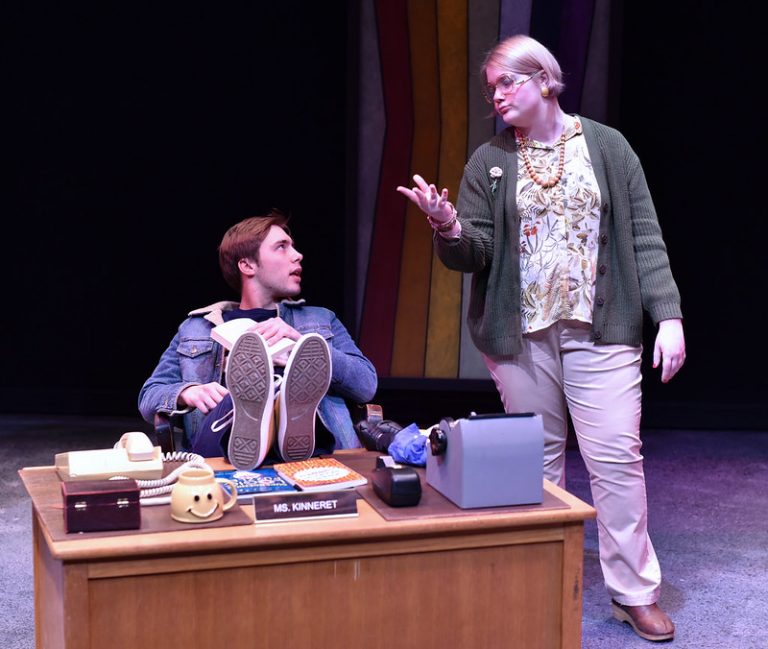BIG LOVE: an update of a classic myth with a timeless theme
By Robin Goldberg
The central storyline of Big Love is based on a classic Greek myth, The Danaids. The writer, Aeschylus, drew his inspiration from Danais, a Greek epic poem written by a “cyclic poet” (one of Homer’s contemporaries). The poem existed mostly in fragments and has been largely lost to time.
The Greek noble Danaus had fifty daughters, referred to as the Danaids. His twin brother, Aegyptus, wanted to marry the girls off to his fifty sons. Danaus didn’t approve of his wild, aggressive nephews, so father and daughters fled to the Greek island of Argos to escape Aegyptus’ marriage proposition. When Aegyptus and his sons followed them to the island, Danaus agreed to the marriages only to spare the Argive people from violence. To get them out of the deal, he convinced his daughters to conceal daggers in their bodices and kill their husbands on their wedding nights. Forty-nine of the Danaids complied. Only Hypermnestra refused. After falling in love with her husband, Lynceus, the two fled. Furious with his daughter for disobeying him, Danaus wanted her tried in court. Aphrodite herself then stepped in to argue for Hypermnestra’s innocence. Lynceus later killed Danaus to avenge his brothers’ murders. He and Hypermnestra stayed on in Argos and began a lineage of great kings heroes, including Perseus and Heracles.
There is no singular consensus concerning the fates of the other Danaids. One version of the story stated that the sisters buried their husbands, and were “purified from their crime by Hermes and Athena, at the command of Zeus.” (Greek Myth Index) Afterwards, Danus had a terribly difficult time finding them suitable husbands, and eventually had to hand them off as prizes to victors of competitions and foot races. According to a version by Euripides, the remaining sisters were killed by Lycenus alongside their father. The more common version states that, upon their deaths, the other Danaids were sent to Hades and sentenced to an eternity of trying to fill a bathtub with sieves. Only when and if they were ever able to fill the tub would they be able to cleanse themselves of their sins.
The iconic Greek playwright Aeschylus (524-455 BC) was inspired by the story of these women. Aeschylus was the author of over 80 plays, only seven of which have survived in their original, full form. Best known for The Oresteia trilogy and Persians, Aeschylus is considered the father of Greek tragedy. Aeschylus crafted a series of four plays documenting the Danaids’ struggle: the Danaid Tetralogy. The first of the plays, The Suppliant Women, served as one of the main sources of inspiration for Big Love. Aeschylus’ play covers the very beginning stages of the Danaids’ story: the discovery of the marriage plot and the escape to Argos. The other three plays suffered the same fate as most of Aeschylus’ other works.
Regardless of historical context, each variation of the Danaids’ legacy highlights the shortcomings of our society. With the contemporary stage adaptation, the roles of many characters have changed significantly. The girls’ father is no longer the driving force of the central action, but rather a nameless, offstage character with more traditional leanings. He refuses to defend his daughters’ wishes, preferring instead that they follow through with their promise. More importantly: the daughters themselves are no longer portrayed as merely passive and obedient, but rather as capable, independent women, ready to defend their basic human rights. These character updates clearly reflect the evolving issues of the time. Despite other cultural advancements, women are still treated like second-class citizens on a global scale. The story of Thyona, Lydia, and Olympia strikes such a chord with audiences because it is still so relatable. Perhaps someday soon the need to treat women as equal partners will finally be fully accepted, and Big Love will be the last update of the story.
Big Love runs October 3-6 in the Greene Theatre. For tickets, click here or visit the Paramount Theater or Cutler Majestic Box Offices.

